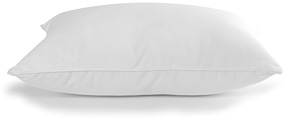To Your Health
August, 2010 (Vol. 04, Issue 08) |
|
|
The most undesirable position for sleeping is on your stomach. This is because you need to turn your head to either side in order to breathe and this can cause neck pain. Often I notice that people who sleep on their stomachs also throw one or both arms over their head, which can lead to pain in the shoulders as well. Please try to avoid this position, as it is not healthy for your body.
I know you sometimes think it's the most relaxing position, but it doesn't last and can do more damage than good. Many times your body tells you if it is in an uncomfortable position. It wakes you up and makes you move. I know this is a hard one for many of you because your favorite position to sleep goes all the way back to when you were a baby. Try to make sure you make the appropriate changes because they
will help you.
Your Pillow
Think about how you like to sleep before you choose your pillow. People who sleep on their back need a thinner pillow than those who sleep on their side. There are so many pillows to choose from, but my best advice to you is to take your current pillow to your chiropractor and let them analyze it for you.
 When my patients bring their pillows to me, I have them lie flat on their back and check the angle of their head. Your head should not be lifted too high so that it cranes your neck. While on your side, your pillow should cradle your neck so that your spine forms a 90 degree angle with a line through the shoulders.
When my patients bring their pillows to me, I have them lie flat on their back and check the angle of their head. Your head should not be lifted too high so that it cranes your neck. While on your side, your pillow should cradle your neck so that your spine forms a 90 degree angle with a line through the shoulders.
Don't be fooled! Just because you have an orthopedic or fancy memory foam pillow doesn't mean it is right for you. In fact, it could be one of the causes of your sleep problems. Again, let your doctor evaluate your pillow and discuss the best option to maximize your sleep.
A Few Other Ideas to Help Ensure Peaceful Sleep
No distractions in your bedroom. Watching TV, typing on the laptop or listening to your iPod before bed gets your metabolism going and disrupts the body's relaxation mechanisms for getting sleepy. Try to turn off the TV or handheld device at least 30 minutes before bed so you can have quiet time to prepare for sleep.
No drinking alcohol or exercising within a couple of hours of bedtime. These activities affect your metabolism and will delay the onset of sleep.
Keep a consistent bedtime and wake time (even on weekends). This helps to keep your body's clock ("circadian rhythm") regulated. Your body does well on a schedule; if you disrupt that schedule, the body has trouble adjusting. You may get eight hours of sleep if you go to bed at 9:00 a few nights a week and midnight a few others, but the difference in quality of sleep will probably be noticeable. Try to stick to a consistent schedule whenever possible.
Biomechanics of Sleep
You can tell so far that we have been talking about setting up your sleep conditions so that you have the best chances of not only falling asleep, but getting great rest. Now I really want you to stop for a moment and go through your ritual of getting ready for bed, going to bed, sleeping and then waking up the next morning. If you find that you are having trouble getting to sleep, waking up repeatedly in the night or having trouble waking up because you are so groggy or unrested, it's time to sit down and consider how some of the above variables (mattress, pillow, sleep position) may be playing a role.

